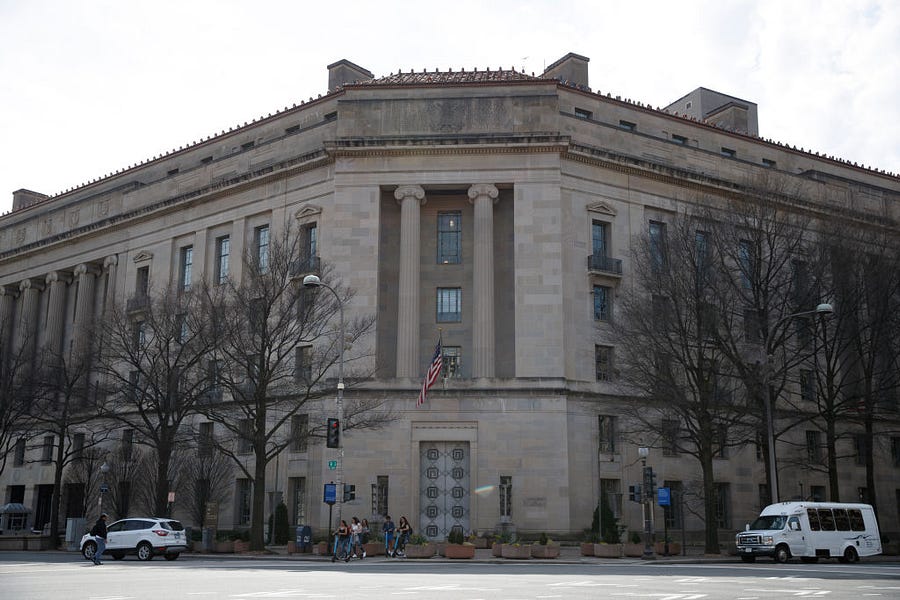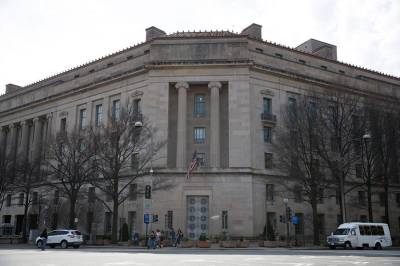President Donald Trump’s administration may be unique in the number of prominent alumni who have come away unhappy or contrite over serving him, including high profile figures such as Anthony Scaramucci, James Mattis, and John Bolton. It was a recurring question from the earliest days of his presidency. Should people who opposed or questioned Trump’s policies or found his temperament offensive take positions in the administration where they might be able to mitigate his worst impulses? Or should they refuse or resign in protest, perhaps to be replaced by more obsequious and less scrupulous functionaries?
One young lawyer who worked in the Justice Department until 2018 took to the New York Times recently to express deep regret for the time she spent working in President Donald Trump’s Office of Legal Counsel, a division Department of Justice where, as she put it, lawyers write “permission slips” attesting to the legality of executive orders. Erica Newland, a holdover from the Obama administration, at first believed that she could better serve the country by “pushing back from within” against Trump’s efforts. And while she and her colleagues succeeded in narrowing some of Trump’s policies, their success came at a price. “We attorneys diminished the immediate harmful impacts of President Trump’s executive orders—but we also made them more palatable to the courts.”
Newland has come to the conclusion that she and her colleagues, who were “some of the country’s finest lawyers,” should all have quit at the earliest opportunity, which would have left the Trump administration in the hands of some of the “second-rate lawyers,” like Rudy Giuliani, who have clownishly failed to overturn the presidential election. Given their “lack of basic legal skills,” says Newland, those attorneys might likewise have failed in their attempts to defend Trump’s Muslim ban and other ugly and destructive policies.
Newland’s heartfelt apology is deeply moving, and I certainly would not have advised anyone to participate in Trump’s “systematic attacks on our democracy,” but she makes two basic mistakes. First, Newland argues that the resignation of elite Justice Department lawyers would have forced the Trump administration to employ lesser talents who would have been unable to achieve any victories in court. Second, she overestimates the ability of top lawyers to sell worthless cases to the courts.
It is true that several leading law firms, including Jones Day and Porter Wright, have declined to represent the Trump campaign in election challenges, but it does not follow that outstanding and highly credentialed attorneys would have refused to step into vacancies at the Department of Justice. In fact, there is a deep pool of conservative lawyers, including some of Newland’s Yale classmates, who would have had no compunctions about advancing Trump’s positions on immigration, civil service, and other political goals.
This brings us to Newland’s second mistake. Having watched Giuliani and his co-counsel flail away in swing-state election cases, she attributes the Trump campaign’s multiple losses to representation by attorneys “who can’t master the basic mechanics of lawyering.” The implication, of course, is that first-rate lawyers might somehow have succeeded in overturning the election, which gives far too little credit to the courts. In fact, the election challenges have bombed because they could not be supported by either law or facts. There was no election fraud, as Attorney General William Barr himself has acknowledged, and there is no legal path to keep Trump in office, as conservative and Trump-appointed judges have consistently ruled.
Even the very best lawyers cannot make something out of nothing. Republican election officials in Georgia and Arizona have ably defended the legitimacy of their electoral processes, which no attorney could have overcome, no matter how gifted and well-trained.
It is understandable that Newland rues her time working for the Trump White House, and it would have been great if she had convinced others to quit when she did, in late 2018. Her essay makes important points about the futility of attempting resistance from inside a lawless administration. In the end, however, lawyers are seldom as irreplaceable as Newland claims. Vacancies at the Department of Justice can be filled in a matter of days, by smart lawyers from leading firms and graduates of the best law schools. Sidney Powell’s fabulist Krakenesque advocacy and Giuliani’s bleeding hair dye turned the election challenges into a joke, but even a more dignified legal team would have run up against the same insurmountable facts.
Mass attorney resignations from Trump’s Department of Justice would have made a powerful statement, but they would not, alas, have changed history.
Steven Lubet is the Williams Memorial professor at the Northwestern University Pritzker School of Law.






Please note that we at The Dispatch hold ourselves, our work, and our commenters to a higher standard than other places on the internet. We welcome comments that foster genuine debate or discussion—including comments critical of us or our work—but responses that include ad hominem attacks on fellow Dispatch members or are intended to stoke fear and anger may be moderated.
With your membership, you only have the ability to comment on The Morning Dispatch articles. Consider upgrading to join the conversation everywhere.